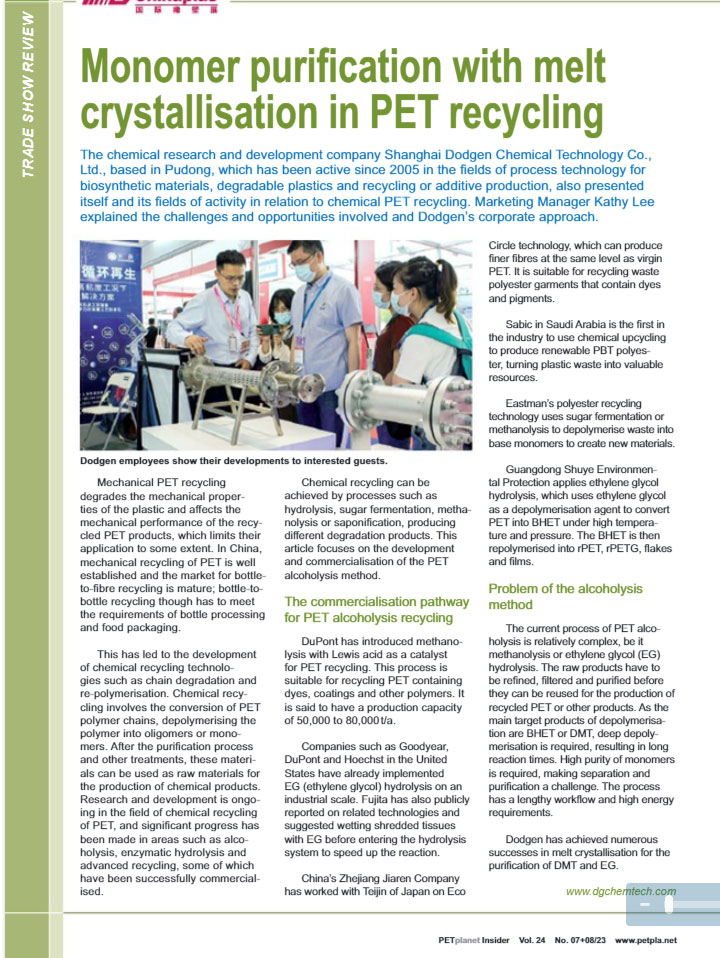reported by PET Planet Magazine
The chemical research and development company Shanghai Dodgen Chemical Technology Co., Ltd., based in Pudong, which has been active since 2005 in the fields of process technology for biosynthetic materials, degradable plastics and recycling or additive production, also presented itself and its fields of activity in relation to chemical PET recycling. Marketing Manager Kathy Lee explained the challenges and opportunities involved and Dodgen's corporate approach.
The recycling rate for PET plastics in China is less than 10%. The main recycling process is mechanical recycling, but this process degrades the mechanical properties of PET and affects the mechanical performance of recycled PET products, which limits their application to some extent.
Although mechanical recycling of PET is well established and the market for bottle-to-fibre recycling is mature, bottle-to-bottle recycling has to meet the requirements of bottle processing and food packaging. This has led to the development of chemical recycling technologies such as chain degradation and re-polymerisation. Chemical recycling involves the conversion of PET polymer chains, depolymerising the polymer into oligomers or monomers. After the purification process and other treatments, these materials can be used as raw materials for the production of chemical products. Research and development is ongoing in the field of chemical recycling of PET, and significant progress has been made in areas such as alcoholysis, enzymatic hydrolysis and advanced recycling, some of which have been successfully commercialised.
Chemical recycling can be achieved by processes such as hydrolysis, sugar fermentation, methanolysis or saponification, producing different degradation products. This article focuses on the development and commercialisation of the PET alcoholysis method.
The commercialisation pathway for PET alcoholysis recycling
DuPont has introduced methanolysis with Lewis acid as a catalyst for PET recycling. This process is suitable for recycling PET containing dyes, coatings and other polymers. It is said to have a production capacity of 50,000 to 80,000 tonnes per year.
Companies such as Goodyear, DuPont and Hoechst in the United States have already implemented EG (ethylene glycol) hydrolysis on an industrial scale. Fujita has also publicly reported on related technologies and suggested wetting shredded tissues with EG before entering the hydrolysis system to speed up the reaction.
China's Zhejiang Jiaren Company has worked with Teijin of Japan on Eco Circle technology, which can produce finer fibres at the same level as virgin PET. It is suitable for recycling waste polyester garments that contain dyes and pigments.
Sabic in Saudi Arabia is the first in the industry to use chemical upcycling to produce renewable PBT polyester, turning plastic waste into valuable resources.
Eastman's polyester recycling technology uses sugar fermentation or methanolysis to depolymerise waste into base monomers to create new materials.
Guangdong Shuye Environmental Protection applies ethylene glycol hydrolysis, which uses ethylene glycol as a depolymerisation agent to convert PET into BHET under high temperature and pressure. The BHET is then repolymerised into rPET, rPETG, flakes and films.
Problem of the alcoholysis method
The current process of PET alcoholysis is relatively complex, be it methanolysis or ethylene glycol (EG) hydrolysis. The raw products have to be refined, filtered and purified before they can be reused for the production of recycled PET or other products. As the main target products of depolymerisation are BHET or DMT, deep depolymerisation is required, resulting in long reaction times. High purity of monomers is required, making separation and purification a challenge. The process has a lengthy workflow and high energy requirements.
Dodgen has achieved numerous successes in melt crystallisation for the purification of DMT and EG.
